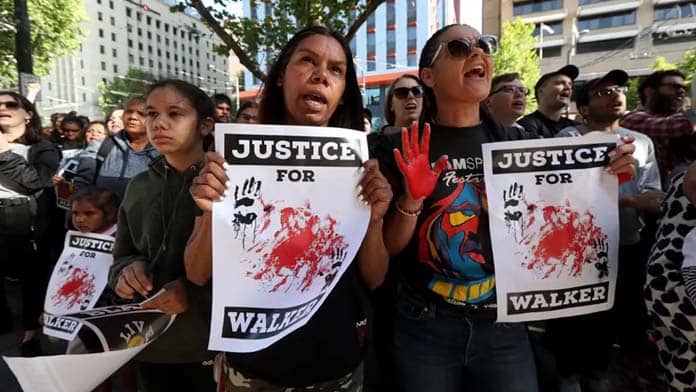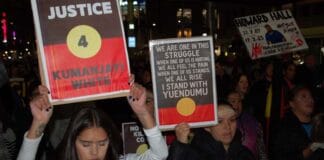On 11 March, a NT Supreme Court jury found Police Constable Zach Rolfe not guilty of murder and two lesser charges. Rolfe shot and killed 19-year-old Kumanjayi Walker in his home community Yuendumu, on Warlpiri land, in November 2019. Almost 30 per cent of the NT’s population is Indigenous, but there were no Indigenous people on the jury.
While his family was kept outside the police station, Kumanjayi slowly bled to death on the floor, 74 minutes after Rolfe’s second shot ripped through his spleen, liver, left kidney and right lung. The police did not issue a press release confirming Kumanjayi’s death until 6:53 the next morning.
Rolfe was charged following a Warlpiri-led protest movement that exploded across the NT and Australia in the wake of the shooting, under the banner of Black Lives Matter.
Outside the court, family members and Warlpiri community leaders expressed anguish, rage and real fear that the decision would embolden police to be ever more brutal.
Ned Jampijinpa Hargraves angrily asked, “When are we going to get justice? When? No guns, no guns in our own remote community. We don’t want no guns. Enough is enough.”
Valerie Napaljarri Martin said: “There is no justice in the kardiya (white) system. We are devastated. Racism killed Kumanjayi Walker. Another young fella the same age as Kumanjayi has just been shot six times by police in Palmerston (near Darwin). He is fighting for his life!”
Ned Jampijinpa Hargraves told gathered reporters that after “going quiet” for two years to wait for justice from the courts, Warlpiri had been left exposed and would now return to the streets to fight for change.
“The court didn’t take action so we need to take action on the ground in our communities to protect ourselves from racist police.”
Throughout the trial, the prosecution built a compelling picture of Rolfe as being out for Kumanjayi’s blood even before he got to Yuendumu. Rolfe had served in the ADF in Afghanistan and completed further weapons training in the US.
Rolfe enjoyed “direct action” operations and had become “fixated” on watching police footage of a previous violent interaction with Kumanjayi.
Evidence suppressed by the court during the trial, but now released, further damns Rolfe. In the months prior to his deployment to Yuendumu he had texted friends in the army: “The good thing is it’s like the Wild West [in Alice Springs] and fuck all rules in the job … we just get to do cowboy stuff.”
Also suppressed was information that Rolfe had been in trouble for previous assaults on Aboriginal people, and had asked another police officer to scratch his face as fake evidence that he had been attacked to justify a vicious assault. In yet another case, Rolfe had lied under oath in an attempt to cover up an assault.
Despite this background, the prosecution had accepted the legality of the first of the three shots Rolfe fired at Kumanjayi, saying this was a legitimate response to Kumanjayi attacking Rolfe with scissors during an arrest attempt. Rolfe was charged only over the second two shots.
But as Ned Hargraves said outside the court: “There is no justification for any shots fired against our young fella.”
Response team
Rolfe was part of an Immediate Response Team (IRT) dispatched from Alice Springs to arrest Kumanjayi. Three of the four police in the team had previously been in the army.
Kumanjayi had a warrant out for his arrest but had already agreed to work with local police liaison officers to hand himself in following a family member’s funeral. Despite the agreement and a plan by local police, Rolfe raided Kumanjayi grandmother’s house, with other police carrying assault rifles, trying to provoke a response. Rolfe had unclipped his Glock pistol before he entered the house.
Since Rolfe’s acquittal, The Australian newspaper has run a disgraceful high-profile campaign against Kumanjayi, publishing multiple negative stories demonising Kumanjayi, and accusing him of being responsible for his own death.
The ABC’s Indigenous affairs editor, Bridget Brennan, labelled the News Corp articles as “reprehensible”.
Kumanjayi Walker was the 420th Indigenous person to die in police custody since the Hawke Labor government’s “Royal Commission into Aboriginal Deaths in Custody” in 1991.
Not a single police officer has been successfully prosecuted over any of the deaths.
Walpiri say that policing has become much more violent and dangerous across the NT following the Intervention in 2007.
They are now demanding police be banned from carrying firearms in remote communities, the repeal of racist Intervention powers and the restoration of community control over services and justice matters.
By Paddy Gibson






